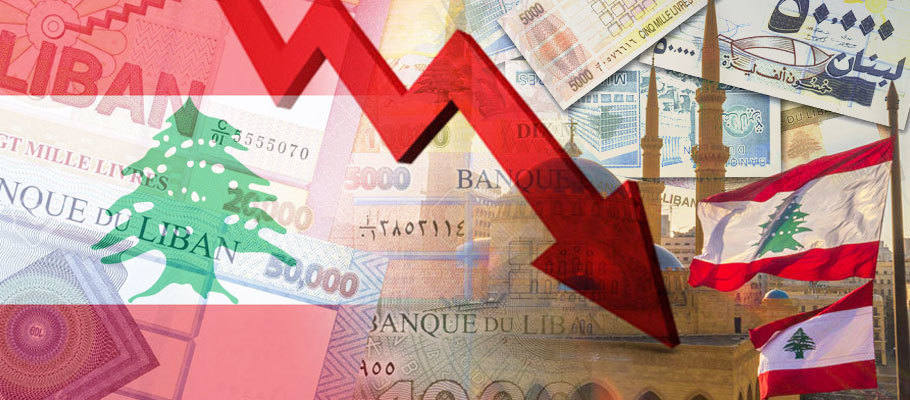
Published: March 5th, 2021
The Lebanese pound fell to its lowest point ever against the greenback this week, setting off a new wave of protests over a deepening economic crisis and jobless rates that have pushed more than half the country into poverty.
Beirut established a USD peg for the pound in 1997 of 1,500, but a cratering economy and dire business conditions, which some analysts say are worse than those seen during the country's 1975-1990 civil war, have combined to drop the pound's unofficial value through the floor.
At mid-week, black market money exchangers told Agence France-Presse that it was trading at nearly 10,000 pounds to the dollar.
Speaking on condition of anonymity, one trader told AFP that the pound’s crash was ‘crazy.’ Meanwhile, angry protesters blocked off main roads and set fire to tyres across Beirut and in other parts of the country. Protestors also came out in force in the northern coastal city of Tripoli and the eastern region of Bekaa, which borders Syria.
Before the latest dip, the Lebanese pound had stabilised for a short time at 8,000 to 8,500 to the US dollar. Back in July 2020, it reached 9,700 to the dollar.
The sudden extreme depreciation may have been triggered by a central bank review of Lebanon's lenders. After receiving international pressure to reform its finances.
As part of a series of demands, Lebanon’s Banque du Liban (BDL) central bank issued a Sunday deadline for lenders to increase their capital by 20 per cent.
At the start of the week, a BDL committee agreed on a roadmap and set deadlines for enforcement action if the new capital requirements aren’t met.
An editorial published by the Beirut-based Al-Akhbar newspaper blamed the currency plunge on commercial banks taking dollars out of the market to meet the BDL’s new capital demands.
The steady drop in the pound’s value has sent food prices soaring in a historically-troubled nation where more than half of the population now lives below the poverty line.
In the wake of the devastating explosion in Beirut’s port last year, which prompted the prime minister's resignation, Lebanon has been without a fully functioning government for months. The massive explosion in a fertiliser storage depot killed more than 200 people and brought new woes to a country already against the wall thanks to the economic crisis.
One protester told Al-Akhbar that the country has been rudderless since the explosion and weak in the face of the COVID-19 pandemic. ‘We've been sitting at home for ages, and they still haven't formed a government. We're sick of these so-called rulers.’
The currency crisis has also spread across the border into neighbouring Syria, whose own fiat currency scraped similar lows this week, making the economic collapse caused by the decade-long civil war even more pronounced.
In Damascus, money exchange offices, the exchange rate hit 4,000 Syrian pounds to the greenback.
Syrian forex analysts told Agence France-Presse that the events in Lebanon are impacting the Syrian pound because Lebanon is one of the few access points the Syrian government has to external markets.
But they said that this was just one element in the Syrian pound's drop on the black market. The parts of Syria under government control have to operate under Western sanctions, leaving the government reliant on Lebanon as a way to access dollars.
Mass protests rocked Lebanon in 2019 when a mass movement formed against what was widely seen as an inept and corrupt political class. The demonstrations stopped when the COVID-19 pandemic landed in the country.
Academics at the Carnegie Middle East Centre said Lebanon's political vacuum had stopped an economic rescue plan from forming, with political deadlock ongoing and no policies or leadership that could halt further collapse from happening.
Lebanon is going through a crippling financial crisis that hit full steam in 2020 when private banks started implementing informal capital controls like restricting customer withdrawals and blocking overseas transfers. The value of the pound plummeted against the dollar alongside an extreme shortage of foreign currencies. Beirut defaulted on its foreign debts and began rescue package talks with the IMF.
While that was happening, reports began to surface last year about alleged capital transfers by senior government officials and their cronies, including the central bank's then-governor, Riad Salameh.
Under questioning by Lebanon’s prosecutor general in October 2020, he denied that he had made any transfers of the bank’s funds after Swiss authorities started looking into money laundering and potential embezzlement by the BDL.
Switzerland’s attorney general said at that time that she had asked for Beirut’s cooperation with a probe into financial dealings coming out of Lebanon. Media reports in Lebanon suggested that billions of dollars may have been spirited out of the country after banks blocked transfers abroad.
Before he resigned from office, then Prime Minister Hassan Diab said Salameh was responsible for the pound’s crash, saying he had deliberately set out a platform of vague monetary policies that pushed the Lebanese pound over the edge and kicked-off the downward spiral against the dollar that continues to this day.
A government-commissioned audit of the central bank petered out after the US-based-based auditor said it could not obtain the documents and information it needed to conduct a proper examination.
Meanwhile, Lebanon’s long-established currency peg against the US dollar has also been blamed for the faltering pound and economy. With the economy reeling, pond depreciation has aggravated price rises for essential goods and evaporated disposable income.
Analysts say tying its exchange rate to the US dollar has created a hidden subsidy for Lebanese imports. Prices for everything from fuel to luxury goods have been lower than they otherwise would have been, effectively letting Lebanese citizens live beyond their means.